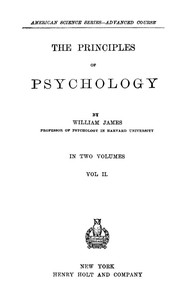The Principles of Psychology, Volume 2 (of 2) by William James
"The Principles of Psychology, Volume 2" by William James is a scientific publication written in the late 19th century. This work is a comprehensive examination of psychological concepts, focusing particularly on sensation, perception, imagination, and the cognitive processes underlying human experience. The text serves as a cornerstone for understanding the complexities of psychology, exploring how individuals interact with the world through their senses. At the start of the second volume, William James
introduces the concept of sensation, distinguishing it from perception and establishing its role in cognition. He argues that sensations are critical as the most basic forms of awareness, enabling individuals to experience immediate qualities of their environment. The discussion emphasizes that pure sensations are rarely encountered in adult life due to the accumulation of memories and associations, ultimately leading to the development of more complex perceptions. James sets the stage for an in-depth exploration of how various cognitive functions interact and informs our understanding of reality through the lens of psychological theory. (This is an automatically generated summary.)
Read or download for free
| How to read | Url | Size | |||
|---|---|---|---|---|---|
| Read now! | https://www.gutenberg.org/ebooks/57634.html.images | 2.0 MB | |||
| EPUB3 (E-readers incl. Send-to-Kindle) | https://www.gutenberg.org/ebooks/57634.epub3.images | 2.5 MB | |||
| EPUB (older E-readers) | https://www.gutenberg.org/ebooks/57634.epub.images | 2.6 MB | |||
| EPUB (no images, older E-readers) | https://www.gutenberg.org/ebooks/57634.epub.noimages | 830 kB | |||
| Kindle | https://www.gutenberg.org/ebooks/57634.kf8.images | 3.1 MB | |||
| older Kindles | https://www.gutenberg.org/ebooks/57634.kindle.images | 2.9 MB | |||
| Plain Text UTF-8 | https://www.gutenberg.org/ebooks/57634.txt.utf-8 | 1.6 MB | |||
| Download HTML (zip) | https://www.gutenberg.org/cache/epub/57634/pg57634-h.zip | 2.2 MB | |||
| There may be more files related to this item. | |||||
Similar Books
About this eBook
| Author | James, William, 1842-1910 |
|---|---|
| Title | The Principles of Psychology, Volume 2 (of 2) |
| Note | Reading ease score: 55.4 (10th to 12th grade). Somewhat difficult to read. |
| Note | Wikipedia page about this book: https://en.wikipedia.org/wiki/The_Principles_of_Psychology |
| Credits |
Produced by Clare Graham & Marc D'Hooghe at Free Literature (Images generously made available by the Hathi Trust) |
| Language | English |
| LoC Class | BF: Philosophy, Psychology, Religion: Psychology, Philosophy, Psychoanalysis |
| Subject | Psychology |
| Category | Text |
| EBook-No. | 57634 |
| Release Date | Aug 4, 2018 |
| Copyright Status | Public domain in the USA. |
| Downloads | 438 downloads in the last 30 days. |
| Project Gutenberg eBooks are always free! | |

